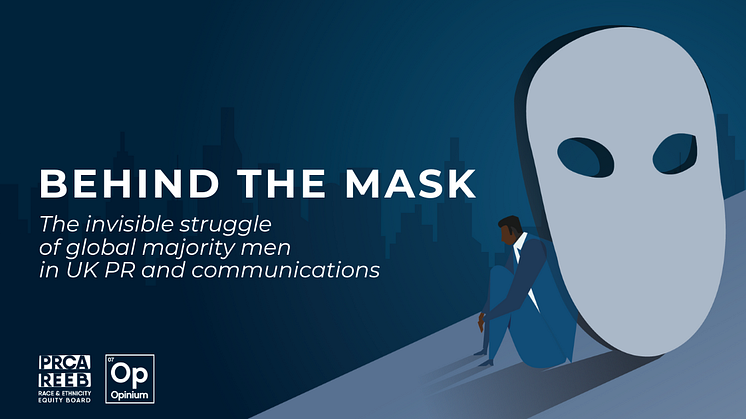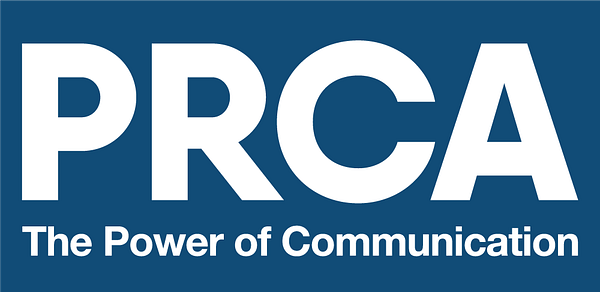
Press release -
Report by the PRCA’s Race and Ethnicity Equity Board highlights the lived experiences of global majority men
The Race and Ethnicity Equity Board, (REEB) a Standing Committee within Public Relations and Communications Association (PRCA) has published an exclusive report revealing the challenges and trials facing men of colour in the industry as well as their successes and notable career highlights. The frank, honest, and at times cringe-worthy in-depth, interviews expose the stark experiences of global majority practitioners across all levels of seniority who were asked to reflect on their experiences of working in PR.
Commenting on the report Emmanuel Ofosu-Appiah, Vice Chair of REEB said: “Although we are in 2023 this report is still pioneering and an eye opener – it’s the first time, we believe, that the views of global majority males and specifically Black, Asian and other ethnic men in PR and communications have been recorded and presented in this way – and the men who were interviewed are definitely pioneers. Many have forged a career path largely without mentors or any direct industry contacts, and they have lasted the course. Much of their success has come in spite of not always feeling that they truly belong; by operating from behind a mask.
It is important to recognise that these men have achieved some great results in their careers despite challenges along the way. Personally, I have been fortunate enough to have worked with great mentors, line managers and teams who have pushed me to reach my full potential so I am now in a position where I can inspire others and give back to the next generation. We hope this study opens up the conversation and we feel it is a step in the right direction. We intend to continue making progress and create a safe space to connect with more diverse men in our industry and ultimately contribute to much needed change.”
Key findings focus on the general lack of diversity in industry, organisational culture, career highlights, promotion, mobility and salaries with much of the successes of the pioneers coming from operating from behind a mask.
Hesitation to be their true self
Global majority men suffering from imposter syndrome in PR and not being able to be themselves was a prominent theme. “I’m a little bit too wooden, a little bit too cold, a little bit too serious, a little bit too bureaucratic. Is there any wonder why I’m a consummate professional, when being a consummate professional is the only way I’ve been able to survive?” one participant said.
Most participants enter the industry with the expectation they will not be in the majority due to their ethnicity and gender, therefore they’re conscious about their behaviour and adapt it over time, including adopting posher accents, changing their physical demeanour, altering their physical appearance and hardening their exterior shell in an attempt to make it easier to ignore microaggressions.
Success and long term career progression
The report also champions successes, with confidence and a genuine passion for the PR sector being evident in driving career goals. The REEB study also noted the critical importance of line management and one participant flagged how over the years he had benefited from supportive line managers who championed DE&I in their own lives. In addition to this, he partnered with a mentor who focused on dedicated time to learning and development to support his progression. This is a key point as many ethnically diverse men often struggle to see others that look like them so it is increasingly important to have internal champions and mentors who can ensure success and long-term career progression. It is also key these men feel as if they can proudly shout about their career highs now, without fear of judgement given many have already left the PR industry due to lack of support or no real career pathway available to them.
Perception
How colleagues and employers perceive men of colour was also a key theme: “You have to think about how you’re being perceived. Am I being seen as the angry or aggressive Black person or all those kinds of racist stereotypes? These are the things you always have to think about,” explained one participant.
Whilst there’s acknowledgement that organisations are - in general - trying to make improvements when it comes to ensuring their employees’ wellbeing, global majority men don’t expect this to be properly addressed by their employer. Most professionals are not utilising the offer for counselling and wellbeing schemes, as they feel that current offers are ‘one-size-fits-all’ and can blur the lines between their professional and private lives.
Many of the participants still desire to progress and influence the industry for others. However, ethnically diverse males report not having access to senior colleagues from a similar background to mentor them as they adapt to the industry or seek guidance on progression, which is critical to ensure retention and promotion.
The full report and research by Opinium is available here.
Notes to Editors:
The PRCA Race and Ethnicity and Equity Board (REEB) founded in July 2020, is a Standing Committee of the PRCA that exists to create both immediate and long-term proportional racial equity within the PR and communications industry.
REEB has also published an Ethnicity Pay Gap report and launched PRISM, a targeted mentoring scheme PRISM.
For more information, please contact leigh.purves@prca.org.uk or gabriela.weiss@prca.org.uk.
Topics
The Public Relations and Communications Association (PRCA) is the world’s largest professional PR body.
Representing 35,000 PR professionals in 82 countries worldwide, we are a global advocate for excellence in public relations. Our teams across Europe, the Middle-East and Asia-Pacific work with professionals around the world to co-ordinate our operations across six continents.
Our mission is to create a more professional, ethical, and prosperous PR industry. We champion - and enforce - professional standards around the world through our Professional Charter and Code of Conduct. The Code compels members to adhere to the highest standards of ethical practice.
We deliver exceptional training, authoritative industry data, and global networking, and development opportunities.
We also manage the International Communications Consultancy Organisation (ICCO) - the umbrella body for 41 PR associations and 3,000 agencies across the world. Additionally, we support the delivery of the Motor Industry Communicators Association (MICA).


